#lacedaemona
Explore tagged Tumblr posts
Note
https://vm.tiktok.com/ZMF3Gy5pj/
I think that's a misinformation video about women in Sparta. During marriage i believe they shaved their heads so that they were associated to male soldiers, unlike most women in Ancient Greece who styled their longer hair to appeal more to the beauty standards of that time, like depictions of Aphrodite.
So i don't think it had anything to do with sexuality, especially since back then they didn't have a word for that. It's was just a tradition they had that differed from the rest.
Man this is so stupid and it’s crazy how much it has spread once again. I did some research on it and I found that the source is “cracked.com” and it is based on a book where the author (called Dover or something) simply said that this idea “was worth pondering”. And now of course most everyone sucks it up like crazy.
I like how nobody has even a moment’s doubt that this suggests that apparently not a single man in Sparta has ever been anything other than gay or that apparently not a single woman in Sparta has ever been desired (unless it’s another girl I assume hehehe) and apparently men could close their eyes in front of boobs and vulva but they drew the line at long hair on a woman’s scalp. I mean, okay, I understand westerners are fascinated by the different views on romantic and sexual relationships in classical antiquity but they have blown this shit out of proportion to a ridiculous degree.
I like how they say women shaved their heads so that their husbands would feel like they were sleeping with men but it escapes them that:
Spartan men had long flowing hair or braids so women shaving their heads for their gay husbands kinda defeated the purpose


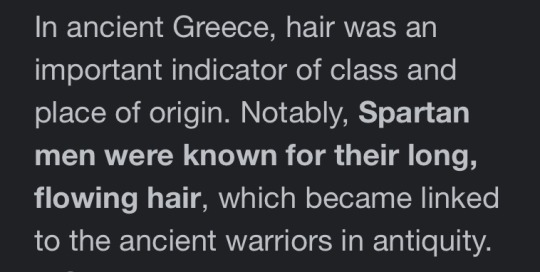

Lol
Spartan maidens and unmarried women had long hair and dressed lightly, almost provocatively in order to entice a suitor. Therefore they did not try to hide their femininity when actively looking for a husband. They also married at an older age (19) than women in other places in Greece, therefore they might as well have had more matured feminine figures in their early marriage than the average.
As to why they shaved their heads during the wedding and kept it short afterwards, I do not know and there is obviously no conclusive scientific answer to this but I can think of alternatives that are a little more realistic given Sparta’s peculiarities than this western sex obsession suggests.
There is one symbolism that is very widespread when a woman cuts her hair in old cultures, and it has survived until recently; that of a woman grieving. Of denying her female beauty and refusing the joys of youth and love. In Sparta, cutting off the hair might have symbolised that the rosy carefree era was over for the woman. It was time to leave her own family behind and dedicate herself to giving birth to strong boys (and get rid of the weaker ones) and making them even stronger, more hardened and very disciplined until it was time to start their military training in the ripe age of 7. Happy tender motherhood wasn’t what was expected from Spartan women. We know that Ancient Spartans interpreted childbirth and motherhood as the war destined for women. Women dying in childbirth were honoured as men fallen in battle. Therefore cutting the hair probably meant that the woman had transcended into a new state, a serious, solemn and grave one, with no room for frivolous vanities and other “womanly concerns”. Is this what you also meant by saying “they were associated with soldiers after marriage”? Of course on a more superficial level it could also be a sign that the woman was married, therefore she shouldn’t be courted by another man.
Anyway, I am no historian but I think my (our) theory is better than that nobody in Sparta could get it up at the sight of long hair (on a woman).
#Greece#Ancient Greece#Sparta#history#greek history#Laconia#lacedaemona#greek facts#anon#mail#opinion#women in antiquity
87 notes
·
View notes
Text
Penelope's Plea
Ovid, Heroides I “Penelope Ulixi”, lines 1-12 Your Penelope sends these words To you, delaying Ulysses; It does no good for you To write me back – come yourself! No doubt that Troy – hateful To Greek maidens – now lies prostrate: Scarcely was Priam worth so much - Scarcely was all of Troy. O, how I wish that on that day When the adulterer went in quest Of Sparta with his fleet, he’d Been swallowed by raging waters! Then I wouldn’t lie, chilly, On a deserted bed, Nor, abandoned, would I lament The daylight’s tardy coming; Nor, as I seek to cheat The endless-stretching night, Would the loom-warp, hanging down, Weary my widowed hands. When have I not feared dangers Worse still than the truth? Love is a thing that’s always full Of anxiety and fear. Haec tua Penelope lento tibi mittit, Ulixe; nil mihi rescribas attinet: ipse veni! Troia iacet certe, Danais invisa puellis; vix Priamus tanti totaque Troia fuit. o utinam tum, cum Lacedaemona classe petebat, obrutus insanis esset adulter aquis! non ego deserto iacuissem frigida lecto, nec quererer tardos ire relicta dies; nec mihi quaerenti spatiosam fallere noctem lassaret viduas pendula tela manus. Quando ego non timui graviora pericula veris? res est solliciti plena timoris amor.

Penelope and the Suitors, John William Waterhouse, 1912
#classics#tagamemnon#Latin#Latin language#lingua latina#poem#poetry#translation#poetry in translation#Ovid#elegiac couplets#Roman poetry#Ancient Roman poetry#Latin poetry#Heroides#classical mythology#Odyssey#The Odyssey#Penelope#John William Waterhouse#Latin translation
178 notes
·
View notes
Text
All the places that participated in the Trojan War on the side of the Greeks according to the Iliad
Below is a list of all the areas mentioned by Homer, in their original names. Bold text is used for areas that retain their name, places that still exist and are inhabited or are unearthed ancient settlements. However, please keep in mind that my English transliteration might be all over the place, as I transliterated them on my own straight from the ancient text.
Boeotia: Aulis, Skhinos, Eteonos, Skolos, Thespia (nowadays Thespies), Mykalissos, Graea (nowadays Tanagra, do I keep it? It’s also the origin of the name Graecia > Greece), Arma, Eilesio, Erythres (nowadays a part of Attica), Yli (built near the lake that is still called Yliki), Peteonas, Okalei, Medeon, Thisvi, Koronia, Aliartos, Plateae, Ypothives, Oghistos, Arni (later Chaeronia), Mideia, Nisa, Anthidona (nowadays the area belongs to Euboea), Orchomenos, Minio, Asplidona.
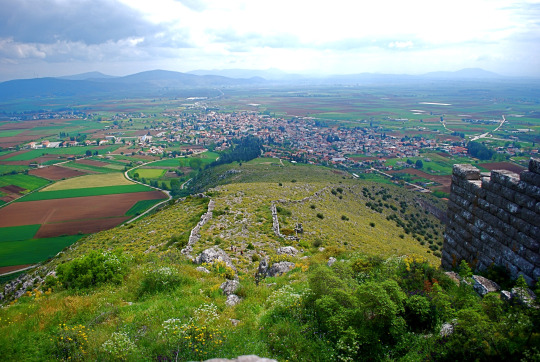
Orchomenos
Phocis: Kyparissos, Pythona, Krissa (now Khrisso), Daulis, Panopeas, Anemoria, Iampolis, area around Kifisos river, Lilaea.
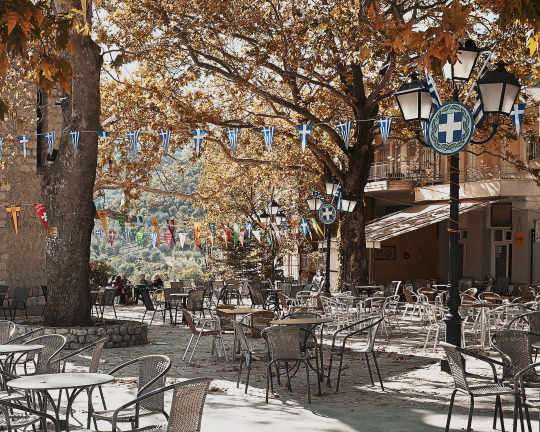
Daulis
Locris (present-day parts of Phocis and Aetolia-Acarnania): Kalliaros, Cynus, Opus, Avyies, Vissa, Skarfi, Tarfi, Thronio (the nearby settlement nowadays is Neo (new) Thronio, in Phthiotis).
Euboea island: Chalcis, Eretria, Istiaea, Kirinthos, Styra, Karystos (a 100% there, well done Euboea)

Chalcis
Athens
Salamina island
Argos (also called Argolis): Argos, Tiryntha, Hermione, Asini, Troezen, Heiones, Epidaurus, Aegina island, Masita, Mycenae.
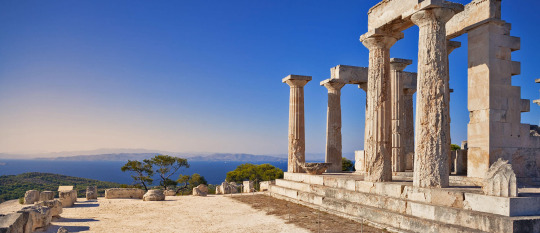
Aegina island
Corinth, Kleones, Sikyona (nowadays Sikyonies), Tonoessa, Yperisia, Aegio, Pellini, Aegialos, Eliki.
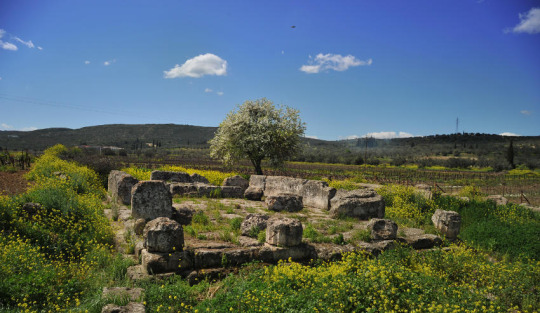
Ruins of Ancient Kleones
Lacedaemona (also called Laconia): Sparta, Fari, Messi, Vrysies (could it be associated to the current village Vryses?), Avyies (could it be associated to the current town Aeyes?), Amykles, Elos, Loeo, Oitylon.
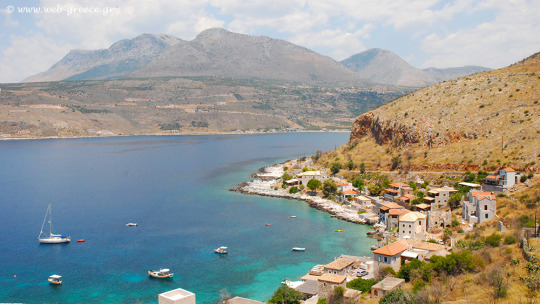
Oitylon
Pylos, Arini, Thryo, around Alfios river, Kyparissienta (nowadays Kyparissia), Amphiyenia, Pteleos, Elos, Dorion.
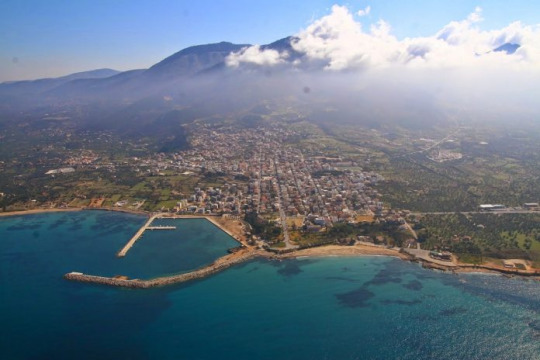
Kyparissia
Arcadia: Mount Kyllini, Feneos, Ripi, Stratia, Orchomenos, Enispi, Mantineia, Stymphalos, Parrasia.
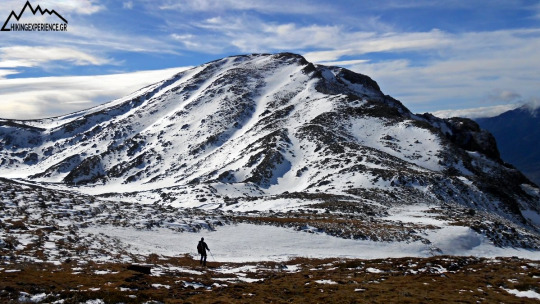
Mount Kyllini
Ilida, Vouprasio, Yrmini, Myrsinos (nowadays Myrsini), Olenia, Alisio. Echinae islands (nowadays Echinades), Doulihion island.

Echinades islands
Cephalonia island, Ithaca island, Krokylia, Aeyilipa, Sami, Zakynthos island.

Beach in Sami, Cephalonia island.
Aetolia: Pleuron, Olenos, Pyllini, Chalcis, Calydona.
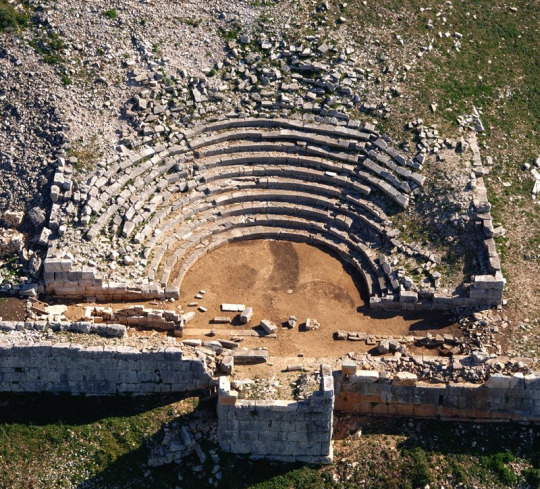
Ancient theatre found in Pleuron
Crete island: Knossos, Gortyna, Militos (there is a place named Milatos nowdays, not sure it’s the same), Lyktos (nearby village named Lyttos), Lykasto, Phaestos, Rytio.

Gortyna.
Rhodes island: Lindos, Ialysos, Kameiros.
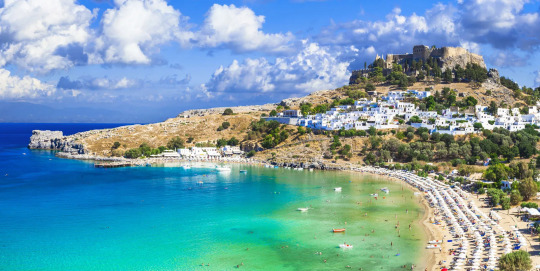
Lindos
Symi island, Nisyros island, Krapathos island (nowadays called Karpathos), Kasos island, Kos island, Kalydnes island (nowadays Kalymnos...do I keep it?)

Nisyros island
Halos, Alopi, Trihina, Phthia, Hellas. (Note: Homer now jumps north, towards Thessaly. He already mentioned regions of Phthiotis, however the Ancient Phthia corresponded to modern Phthiotis but also extended very much in the north, across Thessaly. As you also see, Hellas in Homer’s time was nothing more than just another area, although it was one of the areas, alongside Phthia and the rest here, controlled by Achilles. This might have been the reason its name grew so much in significance that eventually overpowered everything else and became the name of the nation and its lands. That happened very soon, maybe within a century or two after the Homeric Epics.)
Pyrasos, Itona, Androna, Pteleos, Fylaki, Feres, Boibeis (mostly known as Karla nowadays), Iaolcos (Iolcos, later Volos through a painfully gradual procedure, do I keep it?), Glaphyres (nowadays Glaphyra)

Fun fact: It is Iaolcos > Iolcos > Yolcos > Yolos > Gholos > Volos. I wish them to get their shit together and go back to Iolcos
Mithoni, Thavmakia, Melivia, Olizona
(Massive Homeric leap to) Limnos island
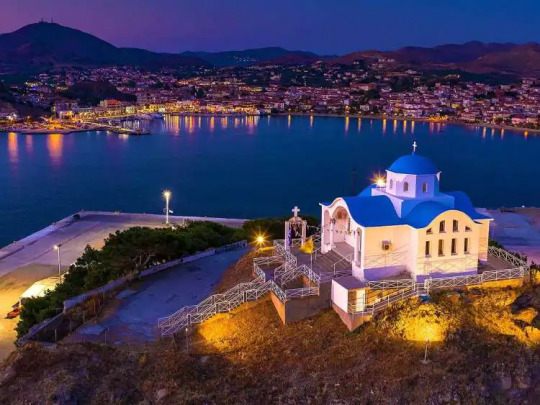
Limnos
(And back again to) Trikki (nowdays called Trikala, do I keep it?), Ithomi, Oehalia.

Trikala
Ormenio, Asterio, Ypereia, mentions the white peaks of Titanos, which must be Othrys mountain, known as the Mountain of the Titans
Argissa, Orthi, Yirtoni, Oloosson (nowadays called Elassona, do I keep it?), Iloni

Elassona
Dodona, referring to it as δυσχείμερον, “which gets bad winters”

Ancient theatre of Dodona
And lastly,
Magnesia: Mount Pelion, characterized by Homer as εινοσíφυλλον, densely-leaved, meaning with dense forests. (Note: Homer does this weird thing, where he says that the Magnetes joined from Mt Pelion, however he has already mentioned several Magnetan locations including Iolcos, Feres, Pteleos etc. Then he makes a giant leap to the east to randomly include Limnos island, then he returns west of Magnesia, to the regions of Larisa and Trikala all the way to the outskirts of Epirus (Dodona) and then he suddenly returns to Magnesia and closes off with Pelion. Beats me.)
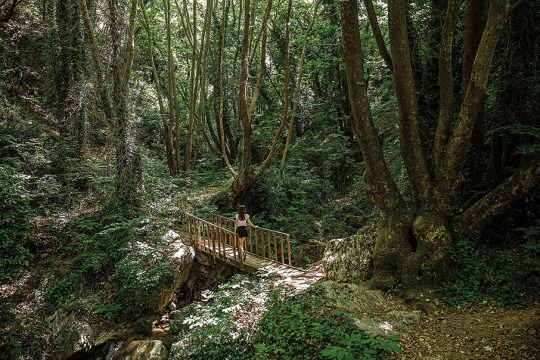
In Mt Pelion
Below is a map with all mentioned regions and their leaders in English.
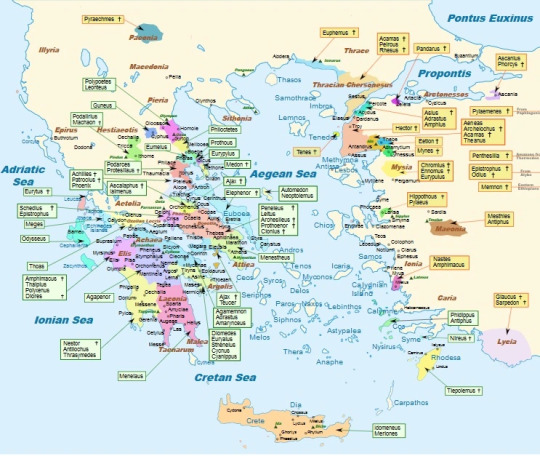
Map from Greek mythology link
#greece#europe#iliad#homer#trojan war#greek mythology#greek history#ancient greece#long post#long text
137 notes
·
View notes